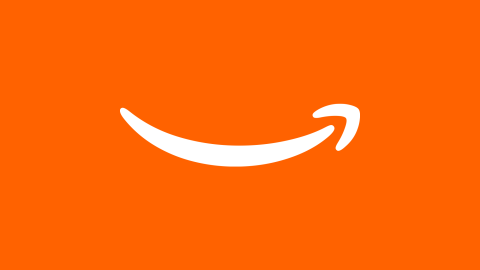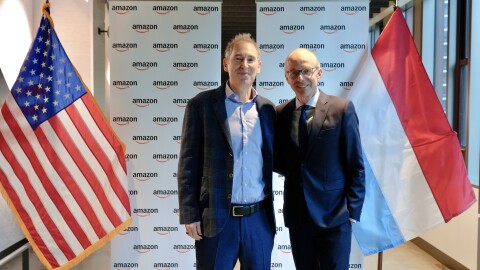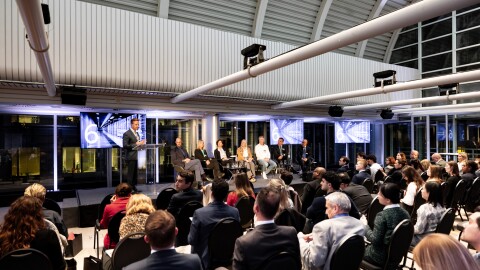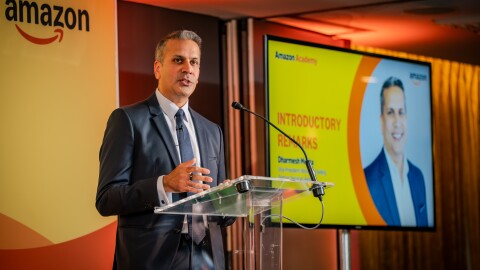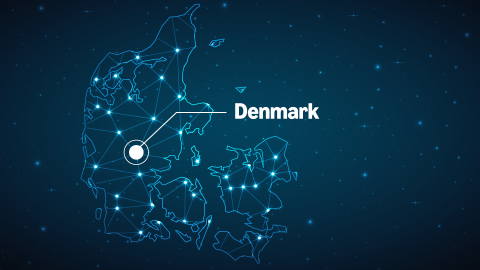At Amazon, we are proud of the work we do to create things that our customers want and love. This takes on many forms: from offering a wide selection of products that people can buy in the Store at competitive prices and with fast delivery, to producing fantastic content for people to enjoy on Prime Video, as well as the work of Amazon Web Services (AWS) in building the cloud computing infrastructure used by businesses and governments of all sizes.
We understand that all this requires investment, and in total since 2010, Amazon has committed more than €150 billion to grow Amazon across the European Union, employing over 150,000 people, to make sure we can keep meeting the high expectations our customers have.
It is because of this work and investment that we are concerned about the calls for an Internet Levy in Europe.
A symbiotic relationship: Quality content & connectivity
Producing the high-quality content and services people love, and providing the connectivity for them to access it requires significant investment from both content producers and internet service providers. We work in a symbiotic way, delivering mutual benefits. Put simply, the content companies like us create is exactly the sort of thing people want to access and creates the value of the connectivity that telecom operators sell to their customers.
In 2021 and 2022, Amazon invested approximately 12bn USD in Amazon Originals, live sports, and licensed third-party content for Prime Video globally. This includes investment in Europe, creating original content for Prime Video, with over 130 new European shows and movies since 2020, including popular and critically acclaimed titles and series such as “Wir Kinder vom Bahnhof Zoo”, “Overdose”, “Mañana es Hoy”, and “The Bad Guy”. We also license sports events, such as the UEFA Champions League, as well as European works from third-party producers for distribution in Europe and globally, such as “Les Misérables”.
Amazon is also investing over 10 billion USD in expanding connectivity through Project Kuiper, a low-Earth-orbit satellite network that will provide fast, reliable and affordable broadband to unserved and underserved communities in Europe and worldwide. Amazon is working with companies like Beyond Gravity and Arianespace to deploy its satellite constellation, supporting suppliers and highly skilled jobs in 13 countries across Europe, and recently announced a collaboration with Vodafone in Europe and Vodacom in Africa to help those companies extend coverage areas for their 4G/5G cellular networks. Vodafone and Vodacom will install Project Kuiper customer terminals alongside their cellular towers, and use Kuiper satellite links to connect the towers back to their core networks.
AWS invests heavily in Europe’s digital infrastructure
Between 2017 and 2022, AWS alone invested in Europe more than €21 billion in cloud and edge infrastructure (direct capital and operational). This figure does not include Amazon’s investments in research and development, marketing and sales expenses. AWS works with Internet Service Providers in Europe and around the world to transform their operations and develop solutions for customers.
AWS infrastructure in Europe includes six EU regions and over 120 Content Distribution Network (CDN) points of presence in 25+ cities across 19 European Member States. What this means is that data can be stored closer to customers, which reduces the amount of traffic on telecommunication networks and transit providers. This reduces their costs. AWS also employs routing algorithms that it has developed to optimise content delivery for performance, availability and cost for customers.
AWS infrastructure is key to achieve a green transition. European businesses can reduce their energy use by almost 80% by moving their compute workloads out of on-premises data centers to AWS. AWS is also developing more energy-efficient silicon.
Consequences for businesses and Europe’s Digital Decade targets
Beyond the creative industries, an Internet Levy would affect the entire economy as it would raise the cost of Cloud and Content Delivery Networks, undermining the small and medium-sized European businesses and start-ups powered by cloud services providers across every sector of the economy. Fifty-five per cent of the estimated €2.8 trillion in gross value added unlocked by the Digital Decade depends on cloud computing[1]. We are concerned that an Internet Levy, similar to other costs, would likely be passed onto customers, which would imply an impact on European organisations using cloud and CDN for providing their content. Thus, imposing such additional costs on cloud providers would likely discourage cloud adoption in Europe, jeopardizing the EU’s Digital Decade objective of “75% of EU companies using Cloud/AI/Big Data” by 2030, and ultimately lowering quality, limiting selection for consumers, and harming innovation. In addition to raising the cost of the cloud, an Internet Levy would also undermine the cornerstone principle of net neutrality.
Double dipping into the consumer pocket through the Internet Levy
As a customer-centric company, we are concerned about the negative effects of an Internet Levy on the cost of living, as well as on the quality and diversity of the digital services made available to EU customers. Such unintended consequences can be observed in South Korea, where a similar measure was implemented in 2020 and the European Consumer Organization (BEUC) has warned against a negative impact on European consumers.
Even putting aside the significant part we already play in creating content and building infrastructure, those proposing an Internet Levy are ignoring that data traffic growth is continuously deaccelerating and does not generate proportional network costs or create structural congestion.
The idea of an Internet Levy is seeking to solve a problem that in reality does not exist. It would increase costs for small businesses, drive up the cost of living for European consumers, undermine net neutrality and Europe’s Digital Decade targets. It is an idea that has been looked at before and rejected, and should be rejected again. This proposal should be called out for what it is: double dipping into the consumer’s pocket.
READ MORE: AWS is deeply committed to helping the telecommunications sector achieve the benefits of The Digital Decade.
READ MORE: EU Commission consultation on the future of the electronic communications sector - Amazon's position
[1] “Unlocking Europe’s Digital Potential”, Public First, 2022.



